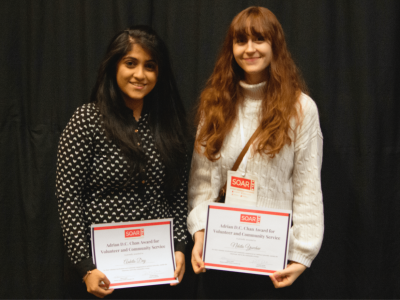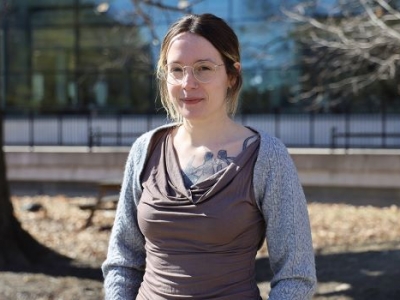The Faculty of Graduate and Postdoctoral Affairs is pleased to announce the winners of the 2014 Graduate Research and Innovative Thinking (GRIT) Awards. These awards acknowledge and support outstanding senior PhD students conducting highly original and innovative research, with the expectation that they will make a significant impact in their respective field of study. Recipients will receive up to $5,000 for travel or other expenses related to their research topic.
We asked all of this year’s winners to describe their research and explain how they will use their GRIT award funds.
 Kara Brisson-Boivin
Kara Brisson-Boivin
International support that once would have flowed more narrowly into development projects (such as disease prevention) increasingly moves into the penal justice sector in Haiti. These humanitarian interventions aim to develop Haitian justice in the image of a Western democracy such as Canada. My dissertation examines how development in the laboratory of humanitarian intervention in Haiti has the potential to illuminate the problems with prescribing normative solutions (democratic penality) to crisis response (natural catastrophe) as universal goals. I will spend one month in Haiti engaged in participant observation and interviews with both local (Haitian) and international penal justice organizations and actors.
 Jane Freeland
Jane Freeland
My research looks at the way East and West Germany addressed domestic violence between 1968 and 1990. I will be using the GRIT Award to attend the annual conference of the German Studies Association, the largest meeting of scholars and historians of Germany in North America.
 Houman Hanachi
Houman Hanachi
In this research, a set of hybrid techniques are developed to estimate the remaining useful life of different parts of gas turbine engines, using the limited measurements from the operating system. This June, I will attend the prestigious conference of ASME Turbo Expo 2014 in Düsseldorf and will present my paper. I will use the award for conference registration fee and corresponding expenses to travel to Germany.
 Ryan Katz-Rosene
Ryan Katz-Rosene
My research examines why Canada doesn’t have a high-speed rail line nor any official plans to develop high-speed rail, despite a long list of social, economic and environmental ‘benefits suggested by the technology’s proponents. I will be travelling to Tampa, Florida, where I will be taking part in a panel session I helped organized at the Annual Meeting of the Association of American Geographers, titled Critical geographies of climate fixes and green infrastructure. [Ryan was also a finalist in the 2013 3MT. You can view his video here.]
 Amanda Lindeman
Amanda Lindeman
My research is on all aspects of acoustic communication in a highly destructive group of bark beetles – Dendroctonus – from the acoustic properties of the signals, how they are produced, and what information they convey, to how these signals are “heard” (neuroanatomy/physiology of potential ears) and how individuals respond to them (neuroethology). This GRIT award will enable me to present at the International Congress of Neuroethology in Sapporo, Japan this July.
 Krystal Kehoe MacLeod
Krystal Kehoe MacLeod
My dissertation is a ground-breaking comparative study of promising practices in integrated home care programs for the vulnerable elderly in Ontario, Alberta and British Columbia. In a paper based on my doctoral research results, I discuss the significant implications of using different approaches (e.g. direct employment, brokering workers or outsourcing) to deliver social care services to home care clients . I will use my GRIT Award to present this research paper at the 14th International Conference on Integrated Care in Brussels, Belgium in April 2014.
 Rebecca Mugford
Rebecca Mugford
My dissertation involves an examination of a number of statistical methods that can be used to link serial crimes using behavioural information obtained from the crime scene (i.e., using behaviours evident at a crime scene to link a number of sexual assaults or break and enters to a single offender). I am doing this with the hopes that police services will be more likely to adopt a statistical approach to linking crimes since statistical approaches are, on the whole, more accurate. I will be travelling to a Canadian police service this semester to collect behavioural information on serial break and enters from their database. I definitely wouldn’t be able to make this trip without the GRIT Award funding.
 Zoe Panchen
Zoe Panchen
My research is assessing the effects of recent climate change on Arctic plant flowering and fruiting times through the analysis of herbarium specimens and field observations. Herbarium specimens are pressed plants collected in the past that provide a historic record of when plants were flowering and fruiting over the past century. The GRIT award will help fund my summer field work in the Canadian Arctic. My field assistants and I will be recording the flowering and fruiting times of approximately 60 plant species at Iqaluit, Baffin Island, Nunavut and Lake Hazen, Quttinirpaaq National Park, Ellesmere Island, Nunavut. I will use the field data we gather as a baseline in analyzing the herbarium specimen historic records.
Wednesday, February 19, 2014 in Awards
Share: Twitter, Facebook




